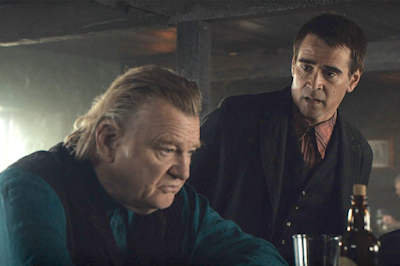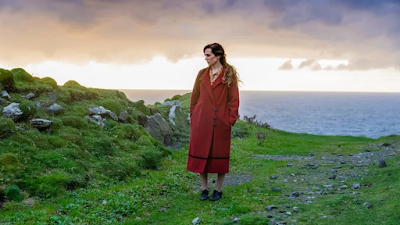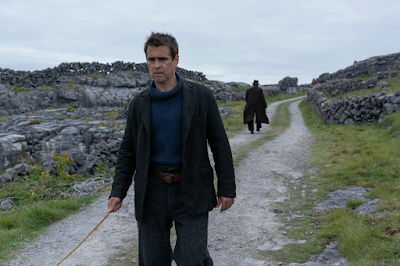I don't know that I'd say it's essential to have an appreciation for black comedy to be able to enjoy Martin McDonagh's films, but it probably helps. Tricia will often give me a disapproving look when I bust out laughing at some morbid development in public affairs or other situation in the world. I just have a deep understanding of the level of stupidity inherent to most of humanity, so it's amusing to me when someone reaches a pinnacle moment. And that's really what The Banshees of Inisherin is all about; a few people striving to escape the dolorous inanity of the rest. Of course, it's also a parable about friendship, how a neighborhood (mal)functions, and the Irish Civil War, so you can be as high-minded as you like. But when it comes down to it, it's mostly about trying not to be a drone, or at least feeling free enough to not be identified as one.
There's no doubt that this is one of the darker of McDonagh's films, which is saying quite a bit. The moments of levity to break up the angst-ridden Pádraic (Colin Ferrell) and the brooding Colm (Brendan Gleeson) are sparse for the first act and only become more frequent because we've begun to understand our characters and their situation and not because they were specifically written that way. Layering on top of that the exasperation and loneliness of Siobhán (Kerry Condon) and the tragedy that is Dominic's (Barry Keoghan) life and there's not a whole lot to find humorous or light-hearted for some time. But then it dawns on you, just as it does with most of his works: It's the absurdity of the situation that turns out to be funny. When Siobhán rails against Pádraic being woeful about losing the friend who never treated him as an equal in the first place or when Colm bemoans the fact that he'll never be remembered as the genius from a tiny island off the coast of a nation at war, it's difficult to stop laughing at the lack of perspective on display. That kind of foolishness is also, of course, a metaphor for the Irish Civil War, one of the more inane of modern conflicts, which is setting the bar quite high, and which continues in the background of our story, with the occasional shrug of the shoulders by one of our characters and a "Hope things are going OK" acknowledgement.
Beyond anything else, I think it's irrefutable that the cast was stellar, which is what you might expect from a solid collection of character actors given a McDonagh script to work with. Another regular aspect of his films is the very interesting and genuine characters that he summons up for each of his stories. From the world's most genial hitmen of In Bruges to the barely self-contained and bereaved mother of Three Billboards Outside Ebbing, MO, it's often hard to forget the people portraying his stories. Banshees is no different. Reuniting Colin Farrell with Brendan Gleeson almost guarantees chemistry on the screen and the two of them didn't disappoint, returning to the easy connection they carried in In Bruges, albeit in a somewhat different situation. It's still Gleeson leading Farrell to the deeper meaning of life, but this time it's not an act of courtesy, but one of bitterness and, eventually, resignation. Sheila Flitton was also fantastic as Mrs. McCormick, who represented one part of the film's title, as she walked around portending death like the spirits of old. The fact that she also annoyed everyone she encountered to the point where she engendered the same level of dread as the legendary creature is just another moment of comedy hidden under layers of scorn and despair for the local neighbors. Dominic was another high point, as he presented someone to look down upon for the lowly Padráic but was one of the more heartfelt characters of the story. The moment where he professes his affection for Siobhán in his halting style and then confesses "There goes that dream." is a genuinely emotional moment in a sea of cynicism and an unwillingness to admit the depression that drives them all to their individual isolated existence. This is a neighborhood of people who often refuse to acknowledge that they're all swimming in this pond together which, again, hearkens back to the war clattering across the strait and the overall search for meaning in what otherwise seems a rather pointless life, which is, of course, the primary complaint of Colm about his existence and his relationship with Padráic.
Banshees will probably not be an easy film to like for many people; just as many of its characters will be likewise difficult to warm up to. Overall, it lacks some of the dynamism of McDonagh's earlier work. The deeper meanings are prevalent, but not exactly pronounced and there's a great deal of time spent in the common activity of early 20th century, rural Ireland. But if you can stay with it and just appreciate the little details that create a much greater skein, I think you'll be able to appreciate the subtle cues that say far more than what's immediately obvious. Personally, I thought it was feckin' brilliant.








